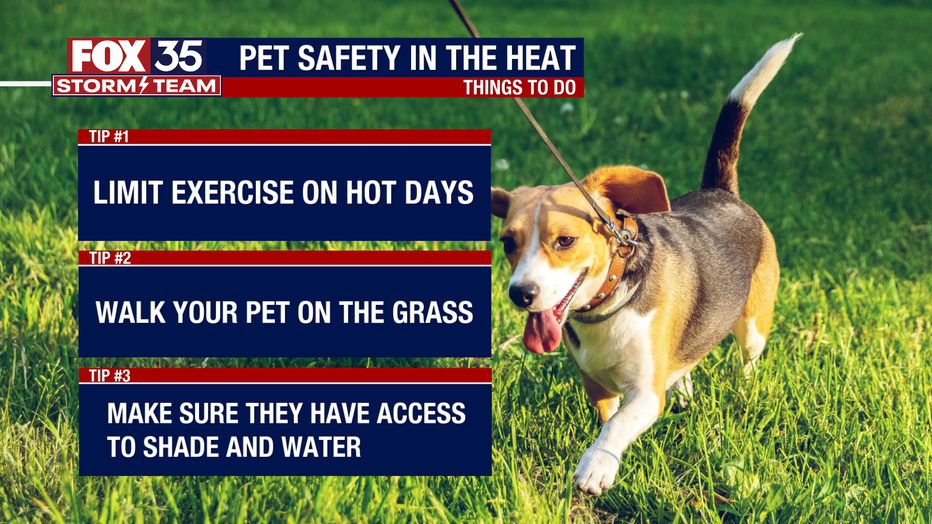Feels-like temps in the triple digits expected in Orlando this week

Feels-like temps could hit triple-digits
Feels-like temperatures could hit triple-digits in Orlando this week.
ORLANDO, Fla. - Get your sunscreen ready for the upcoming week, Orlando – it's going to be a hot one!
Feels-like temperatures could hit the triple digits, making it more likely you – and your pets – could experience heat-related illness. Here's everything you need to know about the week ahead and some safety tips to stay cool.
This week's forecast in Orlando
Forecast highs are expected to reach the mid-90s by the middle of the week, with feels-like temperatures in the triple digits, according to FOX 35 Storm Team Meteorologist Allison Gargaro.
As far as rain goes, chances are low early this week, but are forecast to increase slightly toward the end of the week. The tropics are expected to remain quiet for the next week, too.

Who's most impacted by high temperatures?
The elderly, young children and people with chronic conditions are the most likely to get heat-related illness, according to the CDC.
Signs and symptoms of heat stroke, heat exhaustion
Heat exhaustion is a mild heat-related illness that happens when it's hot and you don't drink enough water, according to the CDC. The elderly, people with high blood pressure and people exercising or working in the heat are at the highest risk for heat exhaustion. Here are symptoms to look out for:
- Excessive thirst
- Profuse sweating
- Headache
- Dizziness or confusion
- Nausea
If you notice these symptoms, the CDC said to get out of the sun immediately and try to cool off.

Photo: CDC/handout
A heat stroke happens when the body's temperature risks quickly and your body can't cool itself down. Heat exhaustion can also lead to a heat stroke. In addition to symptoms from heat exhaustion, signs of a heat stroke include:
- Lack of sweating
- Body temperature rising to 106 degrees or higher within 10-15 minutes
- Skin will feel hot to the touch (even if you don't have a thermometer)
- Loss of consciousness
If you're experiencing any of these symptoms, seek medical help immediately, as heat strokes can cause death or permanent disability if treatment isn't provided.
How to keep yourself safe in the heat
Here are some tips you can follow to stay safe in the heat, according to the CDC:
- Drink lots of non-alcoholic fluids
- Wear sunscreen and continue to reapply it
- Wear a hat and/or sunglasses
- Wear loose, lightweight, light-colored clothing
- Plan outdoor activities when it's cooler in the day
- Rest often
- Try to stay in the shade when outdoors
- Try to limit strenuous activities for one hour per day
How to keep pets safe in the heat
Don't forget about your furry friends when it gets hot out – they can suffer from heat-related illness, too. Here are some tips to help you keep your dogs, cats and everything in between safe when it's hot out, according to the CDC and the American Society for the Prevention of Cruelty to Animals:
- Never leave your pet in a parked car (cracking a window isn't enough – temperatures can rise almost 20 degrees in the first 10 minutes, even if the window is open)
- Provide plenty of fresh water and leave it in a shaded area
- Don't let your pets linger on a hot street or sidewalk
- Keep all unscreened windows and doors in your home closed
- You can trim your dog, but don't shave them as layers of dogs' coats can protect them from overheating and sunburn

Signs and symptoms of overheating in pets
According to the ASPCA, here are some signs your pet might be overheating:
- Excessive panting
- Difficulty breathing
- Increased heart and respiratory rate
- Drooling
- Mild weakness
- Near-unconsciousness
- Collapse
- Seizures
- Bloody diarrhea
- Vomit
- Elevated body temperature of over 104 degrees
What pets are more susceptible to heat-related illness?
Animals with flat faces, like pugs and Persian cats, are more likely to suffer a heat stroke or heat-related illness since they can't pant as effectively, the ASPCA said.
Other pets, like the elderly and overweight and pets with lung or heart diseases, should be kept in the AC as much as possible.

